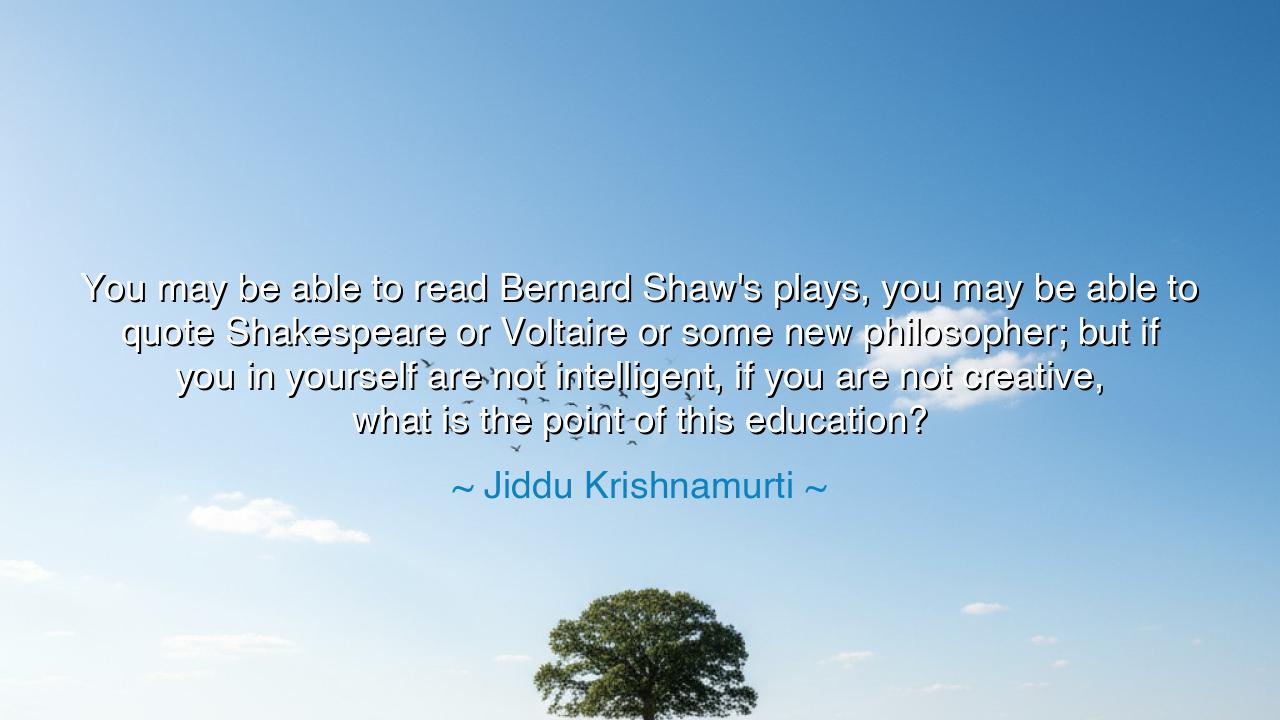
You may be able to read Bernard Shaw's plays, you may be able to
You may be able to read Bernard Shaw's plays, you may be able to quote Shakespeare or Voltaire or some new philosopher; but if you in yourself are not intelligent, if you are not creative, what is the point of this education?






“You may be able to read Bernard Shaw’s plays, you may be able to quote Shakespeare or Voltaire or some new philosopher; but if you in yourself are not intelligent, if you are not creative, what is the point of this education?” — Jiddu Krishnamurti
There are words that strike not the intellect, but the very soul — words that shake the roots of how we think, live, and learn. Such are the words of Jiddu Krishnamurti, the philosopher-sage who sought not followers but awakening. In this quote, he speaks not against education, but against the emptiness that often hides within it — the danger of mistaking knowledge for understanding, of worshipping words without embodying wisdom. To read the great minds of the past — Shaw, Shakespeare, Voltaire — is noble. But Krishnamurti warns that if the mind remains mechanical, merely repeating what others have said, then education becomes imitation, not illumination.
In his time, Krishnamurti saw a world worshiping intellect but starving of insight. He watched societies glorify degrees, institutions, and examinations, yet produce souls that were fearful, conforming, and unfree. He saw that schools taught men what to think, but not how to think. Thus he declared: “What is the point of this education?” For he knew that true learning is not the memorizing of names and ideas, but the flowering of intelligence — that inner fire which questions, perceives, and creates. Without this inner awakening, even the most learned man walks in darkness.
The ancients, too, understood this truth. In the courts of Athens, Socrates stood before his pupils and asked questions, not to fill their minds, but to awaken them. He owned no books, no scriptures — his classroom was the open air, his textbook the living soul. When he was condemned to death for “corrupting the youth,” he smiled, for he knew that the corruption his accusers feared was actually freedom of thought. Like Krishnamurti, he believed that true education begins when one dares to see the truth for oneself, not through the lens of others.
Consider, too, the story of Rabindranath Tagore, the poet of Bengal, who rebelled against rote learning. He built a school under the open sky, where students learned through nature, song, and curiosity. He believed that education should awaken creativity and compassion, not conformity. His students did not merely read poetry; they became poets in the way they observed the world. In this, Tagore and Krishnamurti were kindred spirits — both sought to free the mind from the prison of borrowed knowledge, to awaken the intelligence that creates rather than the intellect that repeats.
When Krishnamurti speaks of being “intelligent” and “creative,” he does not mean cleverness or artistic skill. He means aliveness of perception — a sensitivity to life, a mind that sees freshly and acts with awareness. Such intelligence cannot be taught; it must be discovered within. A child who questions deeply, who observes silently, who feels beauty and sorrow — that child is truly educated, even without books. But an adult who can quote every philosopher yet remains fearful, envious, and imitative — that one is still asleep.
Krishnamurti’s message is thus both profound and practical: the purpose of education is not the accumulation of facts, but the awakening of consciousness. A well-trained mind without wisdom is like a sharpened knife in the hands of a child — powerful, yet dangerous. History itself bears witness to this: men of great learning have built machines of war; scientists have harnessed the atom, yet lost the art of peace. This is the tragedy of knowledge without intelligence — of education without heart.
So, my friend, let this teaching take root within you. Do not be content to quote the wise — become wise. Do not merely repeat beauty — create beauty. Read the words of the masters, yes, but let them ignite your own seeing, not replace it. When you study, do so not to pass tests, but to understand life itself. When you speak, speak not from memory, but from truth you have lived. For education that does not transform the soul is mere training — and a life unexamined is a life unlived.
Therefore, let your education be not in books alone, but in the living world — in silence, in relationship, in failure, in wonder. Watch, question, listen. For true intelligence is not borrowed — it is born. And when that intelligence awakens in you, no library, no authority, no philosopher can ever equal its light. Then, and only then, will you know the meaning of learning — not as accumulation, but as awakening.






AAdministratorAdministrator
Welcome, honored guests. Please leave a comment, we will respond soon